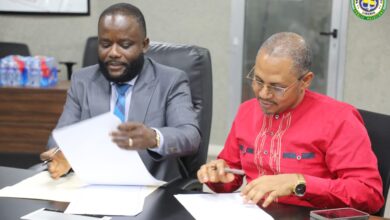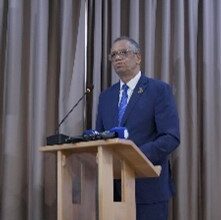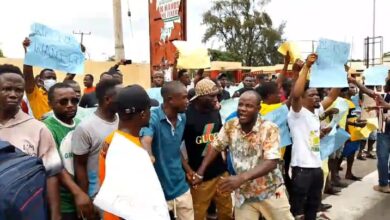The Consequences of US Health Funding Cuts on Liberia: A Call to Action

By Seltue Karweaye Sr
Recently, President Donald Trump’s decision to withdraw the United States from the World Health Organization is threatening funding for critical health programs such as HIV/AIDS and tuberculosis in various parts of the world, including Liberia.
In an appearance on the Voice of America (VOA), Liberia’s Finance Minister, Augustine Ngafuan, stated that canceling a $17 million USAID-sponsored project and other initiatives will directly and indirectly impact the country’s development. Ngafuan highlighted that USAID has been Liberia’s second-largest donor, following the World Bank, supporting health, education, agriculture, and elections projects. Despite these challenges, Minister Ngafuan expressed confidence in Liberia’s resilience and ability to overcome this latest obstacle in its development. The purpose of this article is to outline what Liberia stands to lose in the health sector due to the US halting its funding.
To what extent does Liberia rely on U.S. funding to support its health care system?
Liberia, alongside many other countries in Africa, faces a significant challenge in its reliance on funding from the United States and various international donors to support essential health services and interventions. These services are not just beneficial but are fundamental responsibilities of a government dedicated to ensuring the well-being and welfare of its citizens.
Since 2021, the U.S. government has committed nearly $20 billion to health programs across Africa, highlighting a substantial investment in the continent’s healthcare infrastructure. In 2022, Liberia entered into a bilateral partnership with the U.S., securing approximately US$55 million dedicated to enhancing the health outcomes of its population over the subsequent five years. This funding accounted for around 6.9% of Liberia’s total health budget for that year, underscoring the critical role foreign assistance plays in sustaining health initiatives.
Historically, Liberia has allocated an average of 10% of its national budget to the health sector; however, a large majority of this funding—approximately three-quarters—is directed toward recurrent expenditures, primarily salaries for healthcare workers. This leaves limited resources available for new health initiatives, infrastructure development, and critical supplies.
For the 2025 fiscal year, Liberia’s approved budget totals US$880,661,873, with US$91,347,192 designated for health, which represents 10.4% of the total budget. This allocation reflects a slight decrease from the 10.8% that was allocated in the previous year’s budget, raising concerns about the sustainability of health services in the face of growing demand.
The private sector has increasingly become a pivotal player in Liberia’s healthcare landscape, providing a considerable proportion of healthcare services and financing. In many regions, private healthcare providers often surpass public facilities in terms of accessibility, quality of care, and community reach, thus playing an essential role in filling the gaps left by public health resources. Additionally, traditional medicine is gaining recognition in Liberia as an important source of complementary and alternative treatments, supporting the services provided by the Liberian government.
What vital health programs does the United States support in Liberia?
The U.S. support in Liberia focuses on several key health initiatives, including preventing malaria through the US President’s Malaria Initiative, addressing HIV/AIDS through the US President’s Emergency Plan for AIDS Relief, and promoting Maternal, Newborn, and Child Health (MNCH), as well as Family Planning and Reproductive Health. These efforts also aim to end preventable child and maternal deaths.
Malaria remains a significant public health issue in Liberia, with an estimated 1.9 million cases reported in 2021, resulting in an incidence rate of 358.5 cases per 1,000 inhabitants and 3,548 deaths. According to the Malaria Indicator Survey of 2022, the prevalence of malaria in children under five years old is 10%.
HIV is also a major health concern in Liberia, with prevalence rates among people aged 15-49 ranging from 1.5% to 2.1%. This issue is particularly pronounced in urban areas like Monrovia and among vulnerable populations, including sex workers and young women. In 2021, there were 1,100 deaths related to HIV/AIDS, and approximately 35,000 children aged 0 to 17 have become orphans due to the disease. Additionally, Liberia has faced outbreaks of Ebola, yellow fever, cholera, and COVID-19.
What are the critical elements at risk?
Interventions that are most at risk in Liberia are those for which the government has transferred its responsibilities to foreign donors. These critical services include the distribution of rapid diagnostic tests for malaria, which are essential for timely diagnosis and treatment; the provision of insecticide-treated bed nets to reduce malaria transmission; preventive malaria treatments for pregnant women to safeguard maternal and fetal health; access to fast-acting malaria medications that can effectively combat severe cases; and the application of insecticides for home spraying to eliminate mosquito breeding sites.
Similarly, HIV interventions are likely to experience significant adverse effects. The availability of HIV counseling and testing services is crucial, particularly for pregnant women, as these services help prevent the transmission of HIV from mother to child. Furthermore, the comprehensive care of individuals living with HIV, especially those co-infected with tuberculosis (TB), will be hampered, impacting their access to critical TB/HIV services. Additionally, support initiatives for orphans and vulnerable children affected by HIV/AIDS are also at risk, potentially exacerbating the hardships faced by these populations.
Moreover, the ability to sustain laboratory capacity for rapid disease diagnosis will suffer serious interruptions. A reduction or complete lack of essential reagents and consumables means that timely and accurate diagnostics will be compromised. Much of the laboratory equipment presently in use is provided by international donors, and disruptions in funding will hinder necessary servicing and replacements of this vital equipment.
The health sector in Liberia is confronting numerous challenges, including inadequate funding, a chronic shortage of healthcare professionals, and poor access to healthcare services due to prohibitive costs. Additionally, the nation suffers from inadequate infrastructure, which further limits healthcare delivery and a high prevalence of preventable diseases exacerbates the situation. It is important to note that cutting off U.S. funding will not address the underlying shortage of healthcare professionals. The primary drivers of this shortage are persistently low wages and a deteriorating work environment, stemming from years of neglect and underinvestment in the healthcare system.
What factors contribute to Liberia’s continued dependence on funding from the United States, and what implications does this reliance have for the nation’s future?
Liberia faces a significant challenge in cultivating national pride, while concurrently depending on external assistance to harness the abundant resources at its disposal. This absence of pride is troubling, especially as the government seems to prioritize political interests and external relations over the fundamental well-being of its citizens.
Regrettably, we often refer to ourselves as “America’s Stepchild,” adopting the mindset that Americans owe Liberia a debt of compensation. This notion stems from the historical context of our founding, where a group of permanent Americans from the American Colonization Society attempted to address the growing population of free blacks in the United States by resettling them in Africa. While this history is important, the more pressing dilemma is our lack of self-awareness regarding our identity and capabilities as a nation.
Liberia is frequently labeled as the eighth poorest country in the world, and lamentably, many Liberians accept this designation without challenge or introspection. This characterization ignores the reality that Liberia is not inherently resource-poor; rather, it suffers from mismanagement and inefficiency in harnessing its rich natural resources, which include vast mineral deposits, arable land, and a wealth of biodiversity. The true constraints on our development stem from systemic corruption and a lack of rule of law and accountability, rather than a scarcity of resources.
To break free from this cycle of dependency, Liberians must engage in a collective journey of self-discovery—recognizing our strengths, understanding our rich cultural heritage, and addressing the systemic issues that hinder our progress. Only through a deep understanding of our identity and the immense potential we possess can we begin to forge effective and sustainable solutions to our challenges, ultimately securing the future our citizens deserve.
How can Liberia effectively lessen the impact?
Liberia must urgently allocate emergency funding to address the shortfall caused by recent actions taken by the US government. The decision made by former President Trump to suspend foreign aid should not have come as a surprise, as he enacted similar policies during his first term in office, potentially indicating a pattern of behavior.
Given these circumstances, Liberia needs to re-evaluate its national priorities and ensure that adequate resources are dedicated to fostering an environment where skilled professionals can effectively contribute to disease control and prevention efforts. To illustrate this commitment, the Nigerian government has recently approved an additional $200 million for the health sector. This funding is intended to mitigate the adverse effects of the US aid suspension and is aimed at strengthening health infrastructure and services.
Liberia must prioritize disease prevention and control, focusing on adequately funding disease surveillance activities across all levels of governance. This entails decentralizing these functions by empowering county health departments, enabling them to respond more effectively to local health needs. Furthermore, the National Public Health Institute of Liberia (NPHIL) should play a pivotal role in coordinating health initiatives at the county level. This collaboration with the Ministry of Health is vital to creating a unified response to health challenges, rather than limiting NPHIL’s role to simply managing disease control from a centralized position, which has historically been a point of confusion in other contexts, such as Liberia. By enhancing coordination and resource allocation, Liberia can better safeguard its population against disease threats. I rest my pen.



















